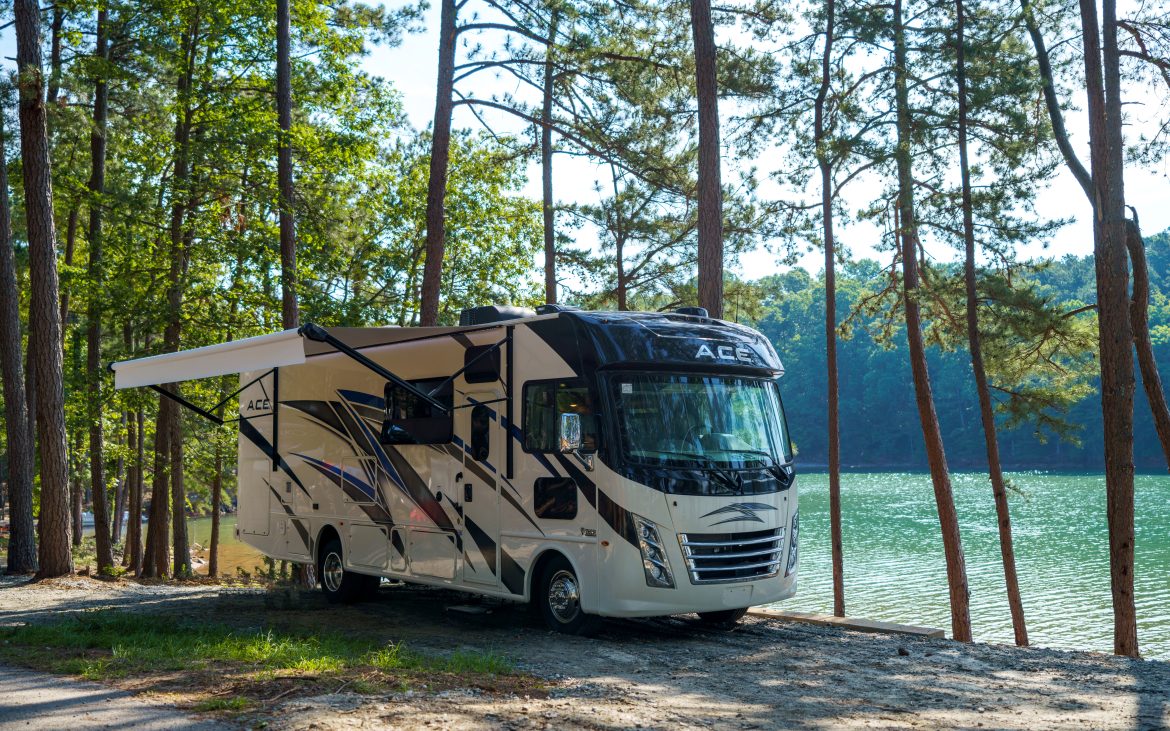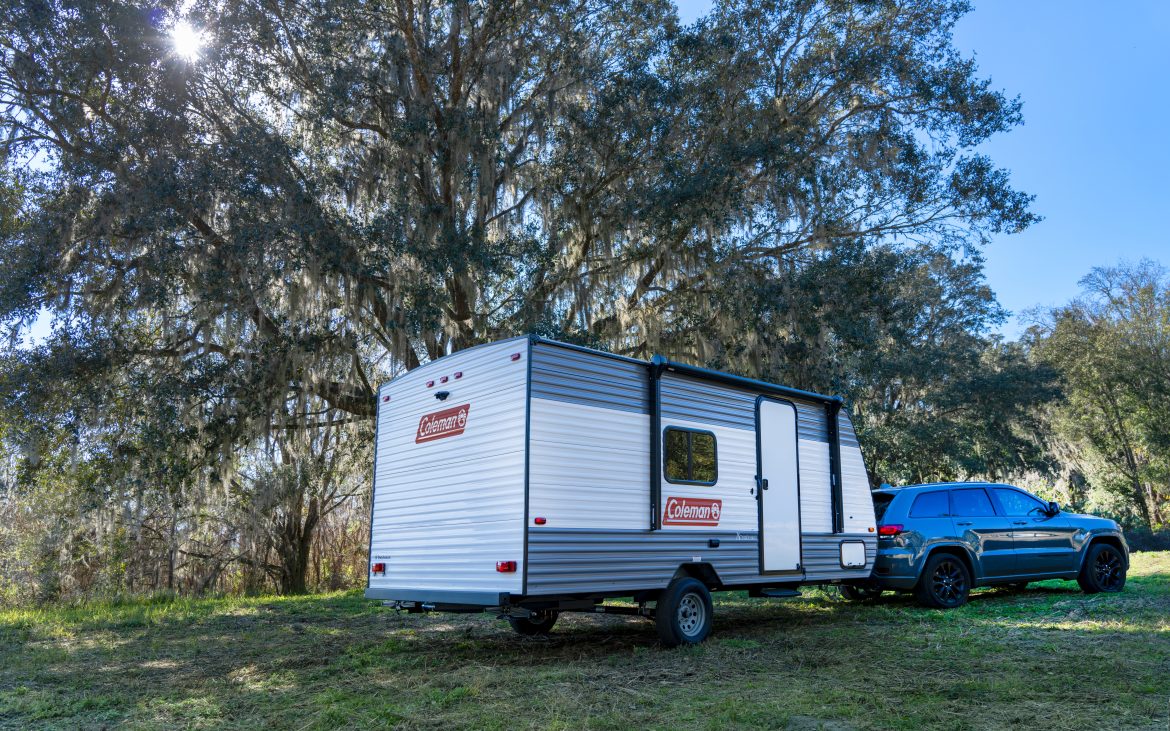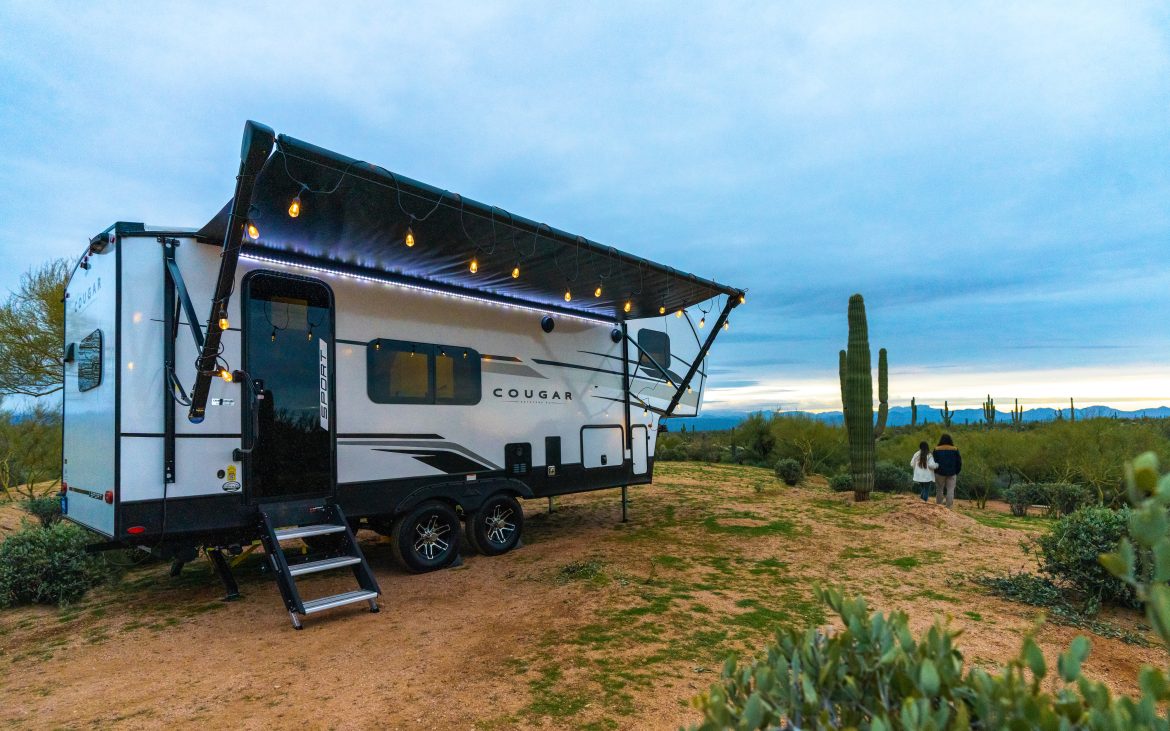The market for RVs remains dynamic. Demand ebbs and flows depending on the popularity of camping, the economy, and other factors. And manufacturers toe the line, building enough RVs to meet demand without exceeding it, year-over-year. The value of your RV will fluctuate depending on these factors. And when you decide whether to sell your RV to buy a new one or to reinvest in your current rig with updates and repairs, its current value matters.
Like autos, RVs depreciate. But by how much and how quickly? And what should you know about how your RV’s value can be maintained and monitored? Here we cover the factors that determine your RV’s value, and we’ll introduce the Good Sam RV Valuator, which provides an accurate near real-time appraisal of your RV’s worth.
Factors that determine your RV’s value

While not hard, fast rules, you can typically trace an RV’s pricetag back to a few key factors. As they say, follow the dollar. Owners pay more for added functionality, newer models, well-known brands, and newer technology. And we pay more when there are fewer RVs to go around. Knowing where your RV falls within these different categories gives you a good idea of where you stand when selling or trading in your RV.
RV type, brand & model
At a dealership, you quickly learn travel trailers are often more affordable than fifth wheels, and that Class As are typically the most expensive items on the lot. Certain brands also command a higher price tag. While trends will change throughout an RV’s lifespan, some research will give you a good idea of what similar types, brands, and models are worth.
Certain name brands and models retain their value longer. We talk further about depreciation, but it’s essential to understand how the used marketplace perceives your RV’s brand, model, and type.
Age of the RV
If you’ve heard of or witnessed the “10-year rule” in effect at a campground, you know that the age of an RV can carry a certain stigmatism, especially if older. While you probably shouldn’t be too worried about getting refused at a campground for owning an older RV, you should know that the older the RV, the lower the value — typically. RV shelf life is a real consideration. But routine maintenance and improvements can help maintain value.
Features & appliances
Consider the features you value when purchasing an RV. Air conditioning? Solar panels? Maybe an outdoor kitchen, extra space in the bedroom or living room. These same features will likely influence the value of your RV, and this might be where you consider upgrades that might increase the overall worth of your RV just by adding an awning, say, or installing a backup camera.
Upgrading your appliances can be a practical choice if they are five years or older. If not, they may still carry their original value.
Mileage
The mileage of a motorhome can affect its price, as the older and more used the RV, the less its value. Keep track of maintenance records like oil and filter changes with your mileage to demonstrate frequent maintenance to a potential buyer. Travel trailers and fifth wheels don’t include an odometer, so this won’t be an issue.
Condition
Damage and problems with your RV or its appliances and features will decrease the overall value of your RV, and it’s best to fix as many of these as soon as they occur should you have an accident or wear and tear naturally occurs. RVs are known to require some form of repair within the first five years, so it’s not necessarily a deal-breaker as long as you are addressing issues as they happen.
More significant problems like leaks, water damage, or holes in the roof can be more consequential. (This is why winterizing your RV is such an important factor).
Every trip, you should complete a pre-trip inspection, which should help you identify potential issues to keep everything in working order. But when it comes time to sell or appraise, consider a more thorough evaluation, like this purchasing checklist, to understand the types of things buyers might be looking for.
Demand
As we saw during and in the following seasons after the pandemic — when people flocked towards outdoor activities like camping and RVing — the demand for RVs fluctuates. When demand is high, your RV’s value increases. When demand is high, and there are fewer new RVs, your RV’s value increases more. The opposite is true as well. Selling your RV at the right time can mean the difference between tens of thousands of dollars.
Reading press releases and updates on the state of the RV industry are good habits to keep. These will provide insight from manufacturers and dealers, and you’ll better understand where the demand might be for your RV at any given time.
Depreciation

Knowing how fast your RV might depreciate helps you make informed decisions as an RV purchaser and owner. The reality is that all vehicles are on a timeline where the older they get, the less valuable they become. But depreciation rates vary depending on the type of RV.
We choose an RV type primarily based on our needs as travelers and campers. Of course, other factors determine what we buy: some RV types require a larger budget than we can afford, or we don’t have the towing power we need for a larger fifth wheel, for example. But as we consider what we can afford and what will best serve our needs as campers, we should also consider the depreciation of certain RV types.
Motorhomes
Generally, the larger and more expensive the RV, the quicker it will depreciate. This puts Class As as the highest depreciating RV. Like with cars, the value of an RV drops considerably when you drive it new off the lot. But motorhomes will depreciate more than other RVs in the upcoming years.
Travel Trailers
Travel trailers are typically the most affordable of towables and have a relatively low depreciation rate. These things hold onto their value fairly well in the years following purchase. After five years, they typically hold onto about 60% of their value.
Fifth Wheels
Historically, fifth wheels depreciate from their original value somewhat quickly, falling by approximately 45% in the first five years. This holds true because the more expensive the RV, the more likely it is to fall in value. This doesn’t mean you won’t still fetch a good price. It will just be a higher percentage less than what you paid for it new.
The RV Valuator Tool

By staying up to date with significant maintenance and upgrading and updating your RV where and when it makes sense, you stand to increase its longevity. And when buyers are considering purchasing, they ask themselves the same question: how long will this last with all components working?
But there’s now an easier way to come to a confident position of your RV’s value, and that’s with the Good Sam RV Valuator Tool. This tool provides you with a near real-time appraisal of your RV, considering how much similar models have recently sold for, market trends, and other important data that will, along with maintenance history, help you gauge where your RV stands.
The RV Valuator also takes into account local marketplace trends, so you know what your RV is worth in which market, which can vary vastly across different parts of the country. Further, the tool privies access to new and used wholesale and retail pricing, so you understand where the markup occurs, often reflecting demand.
Lastly, the RV Valuator accounts for the features of your RV that might not otherwise be accounted for, including unique features, vintage RVs, and customizations and upgrades like those we mentioned that can increase the value of your RV.
The post How Much Is Your RV Worth? appeared first on Good Sam Camping Blog.
By: Carl Corder
Title: How Much Is Your RV Worth?
Sourced From: blog.goodsam.com/how-much-is-your-rv-worth/
Published Date: Sun, 02 Apr 2023 01:17:20 +0000
---------------------------------------------
 CampingSurvivalistHuntingFishingExploringHikingPrivacy PolicyTerms And Conditions
CampingSurvivalistHuntingFishingExploringHikingPrivacy PolicyTerms And Conditions
